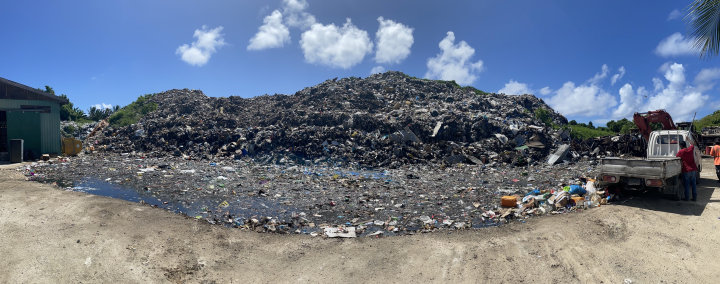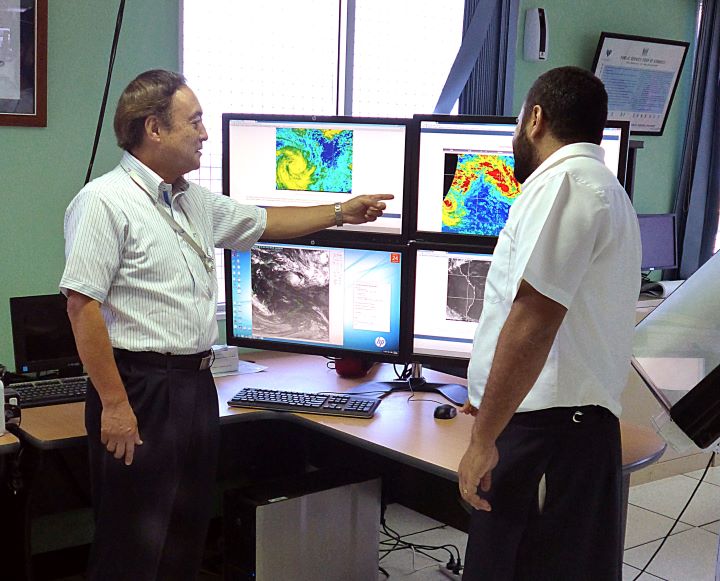Security of Pacific Island Countries and Japan's Role


2024.06.24
-

- Tamio Shinya, Director, Pacific and Southeast Asia Division 6, Southeast Asia and Pacific Department
"The renewed vigour with which a ‘Free and Open Indo-Pacific strategy’ is being advocated and pursued leaves us with much uncertainty."
In August 2018, then-Prime Minister Samoa, Tuilaepa Sailele Malielegaoi made this speech1 at a meeting held by an Australian research institute. Three months earlier, in May 2018, Prime Minister Tuilaepa had co-chaired with then- Prime Minister of Japan, Shinzo Abe at the 8th Pacific Islands Leaders' Meeting (PALM 8) held by the Japanese government, where they welcomed the strengthening of Japan's commitment in the Pacific region under the "Free and Open Indo-Pacific Strategy”.2 How do we read the two different movement mentioned above?
More than five years have passed since this event, interest, especially from geopolitical aspect, for Pacific Island countries (PICs) continues to grow. The Japanese government and JICA, which have been cooperating with PICs as one of the long-standing development partners, are now required to re-adopt to this new era. On the other hand, much of the attention in the media is focused on the traditional security perspective, such as the U.S.-China rivalry in the Pacific, which is represented by the military and security aspects, and it seems the perspective of the island countries is not taken into consideration.
※1
Speech by the Hon Prime Minister Tuilaepa Sailele Malielegaoi on Pacific perspectives on the new geostrategic landscape (lowyinstitute.org)
※2
The Eighth Pacific Islands Leaders Meeting(PALM8)(Overview of Results) | Ministry of Foreign Affairs of Japan (mofa.go.jp)
So, what does ‘security’ look like from the perspective of PICs? In September 2018, shortly after Prime Minister Tuilaepa's speech, the Boe Declaration was adopted by the leaders of all PICs at the 49th Leaders’ meeting at Pacific Islands Forum (PIF) in Nauru3. The Boe Declaration is the first security concept for PICs, and the "expanded concept of security" was developed under this declaration. According to this concept, ‘security’ in PICs is not limited to the traditional security aspects such as military and security, but also includes non-traditional security aspect. The "expanded concept of security" regards climate change as “the single greatest threat” to people's livelihood and well-being, but other issues such as human security, environmental and resource security, transnational crimes, and cyber security are also considered as important to ensure the security regime in the Pacific.

Waste piles up at Marshall's waste disposal site where land is limited.
This "expanded concept of security," which is not limited to traditional security aspects, has been succeeded to the "2050 Strategy for the Blue Pacific Continent," the first long-term development strategy for PICs (commonly known as the "2050 Strategy" adopted in July 2022 at the 51st PIF Leaders’ Meeting)4, and is now the basis of the Pacific island nation's security concept. On the other hand, this "expanded concept of security" in the PICs also affects some part of security aspect of Japan.
In December 2022, the Japanese government released its "National Security Strategy"5. In the section "Global Security Environment and Challenges" in the strategy, it is mentioned as "the Pacific Islands are disproportionally suffering large damages from extreme weather and reduction of land area due to climate change, the global spread of infectious diseases, and shortages of food and energy”. In other words, the development challenges faced by PICs are considered as one of the items that affect Japan's security environment. The strategy then discusses "Climate Change Measures " as one of the means of "Develop Efforts Centered on Diplomacy to Prevent Crises, Proactively Create a Peaceful and Stable International Environment, and Strengthen a Free and Open International Order". Under this section, it states as follows:
"Japan will provide assistance to island nations and other developing countries where climate change poses imminent threats so that sustainable and resilient economies and societies can be built."
This idea suggests that it is also important for Japan's security that PICs overcome the challenges identified in the "expanded concept of security”. Therefore, it is also essential for Japan, which shares the same Pacific Ocean, to cooperate with PICs for their stability and development.
※3
Forty-Ninth Pacific Islands Forum Nauru, 3rd - 6th September 2018 | Pacific Islands Forum Secretariat
※4
2050 Strategy for the Blue Pacific Continent | Pacific Islands Forum Secretariat
※5
National Security Strategy (NSS) | Ministry of Foreign Affairs of Japan (mofa.go.jp)
As geopolitical interests grow, more development partners than ever before are interested in cooperating with PICs. In this complex and changing international environment, what is the role of Japan, which has a long history of cooperation with PICs and has established long-standing relationships with them?
I was once told by Associate Professor Sandra Tarte of the University of the South Pacific, Fiji, that “Japan’s advantage is that it is not viewed with a particular-colored image, like the former country of administration such as the United States and Australia, or China, whose presence has been drastically growing recently”. A recently published online diplomatic journal article6 also made the same point: "Japan’s greatest advantage amid the China-U.S. competition over the PICs is that it is not the United States or China”. One of the unique characteristics of Japan's cooperation is that it has been based on the needs of PICs through people-to-people cooperation. Japan Overseas Cooperation Volunteers were first deployed to this region in the early 1970s, and to date, nearly 5,000 volunteers have worked with the local people in their communities. In addition, more than 16,000 trainees have been received from PICs, and some have been promoted to cabinet positions after returning to their home countries.

PE Class by JOCV at an elementary school in Palau

JICA expert and the officer at Fiji Meteorological Service
I suppose that the people-to-people cooperation has created mutual understanding and contributed greatly to building relationships as "equal partners" that Japan has been able to secure "no particular-colored image" presence in the region. Therefore, in the midst of situation that the international surrounding environment for PICs is undergoing complex changes, I believe that Japan’s critical role for PICs is to contribute for the strengthening of their ‘security’ system by offering relevant cooperation from the perspective of PICs, based on Japan's disaster risk reduction experience and know-how as an island nation.
The special relationship between Japan and the PICs is sometimes described by the leaders of the PICs as "bonds" or "kizuna" in Japanese. I hope and anticipate that the 10th Pacific Island Leaders’ Meeting (PALM10) in July will further strengthen and promote the "kizuna" between Japan and the PICs.
scroll